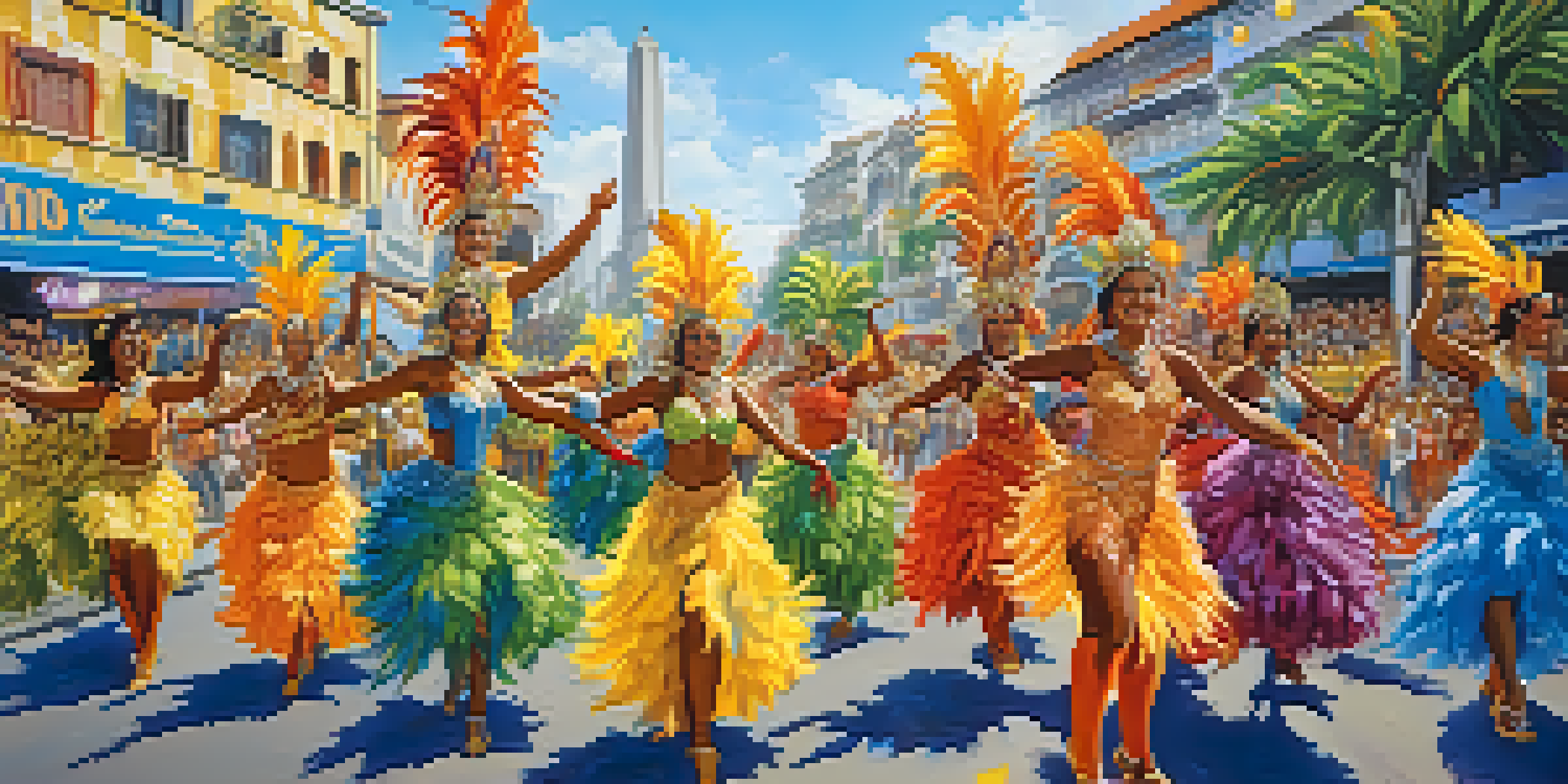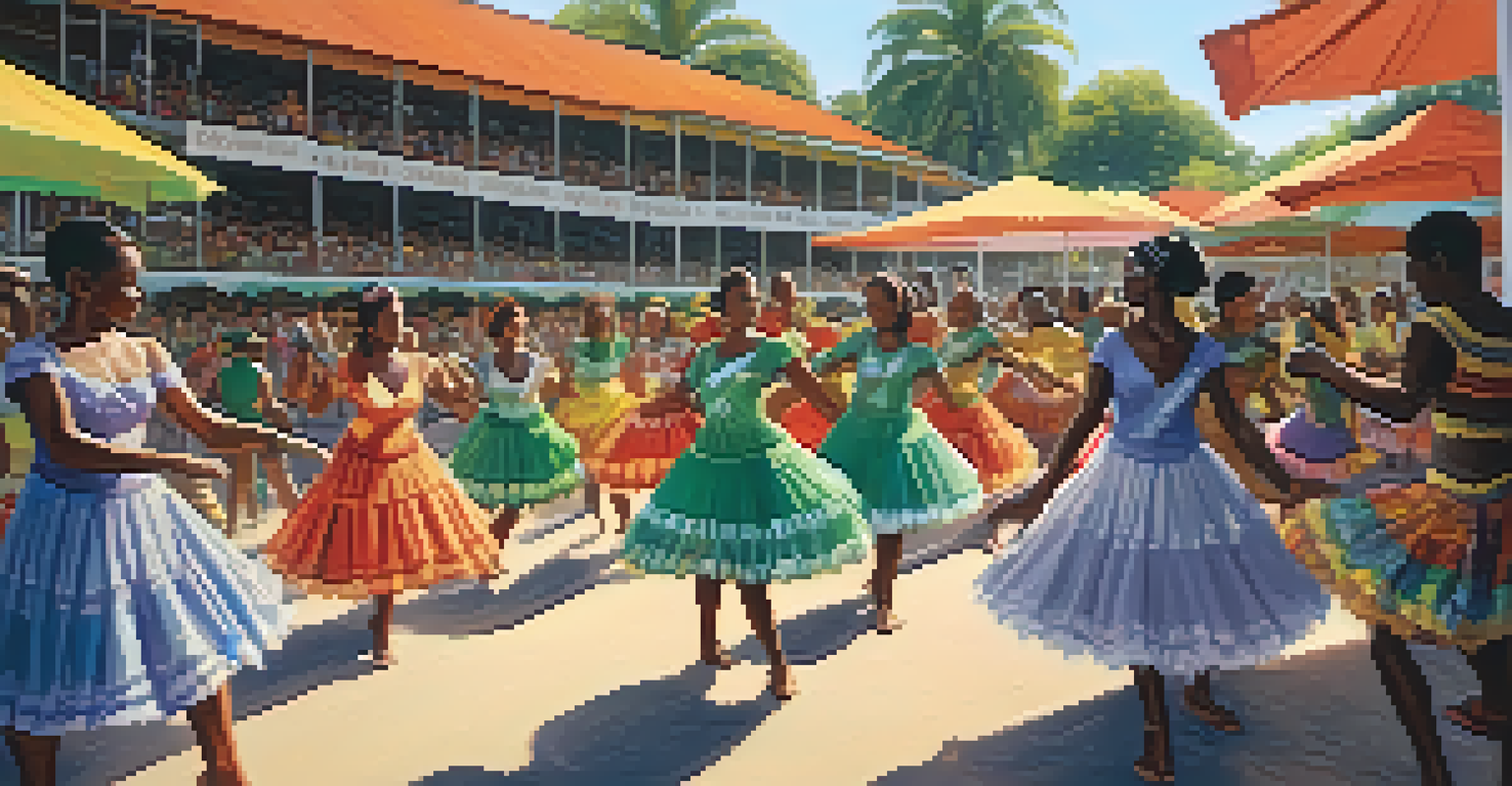The Role of Samba in Brazil's Cultural Identity Today

Samba: The Heartbeat of Brazilian Culture
Samba is more than just a dance; it's a vibrant expression of Brazilian life. This lively genre originated in the Afro-Brazilian communities of Bahia and has since become a symbol of national pride. The rhythm of samba resonates deeply, reflecting the rich tapestry of Brazil's diverse cultural heritage.
Samba is the voice of the people, the music of the heart, and the rhythm of life in Brazil.
As Brazil's most recognized musical form, samba plays a crucial role in uniting people from various backgrounds. Whether in the streets of Rio during Carnival or in local gatherings, samba creates a communal experience that fosters connection. It invites everyone to join in, regardless of age or social status, which strengthens the sense of belonging.
Today, samba continues to evolve, incorporating new influences while staying true to its roots. This adaptability ensures its relevance in contemporary society, making it a living part of Brazil's cultural identity. From traditional performances to modern interpretations, samba remains a dynamic force in shaping how Brazilians see themselves.
Historical Roots: Samba's Journey Through Time
Samba's origins can be traced back to African rhythms and dances brought to Brazil by enslaved people. Over the years, it absorbed elements from various cultural influences, including Indigenous and European traditions. This blending of styles is what makes samba a unique reflection of Brazil's complex history.

The early 20th century marked a pivotal moment for samba, as it transitioned from the marginalized neighborhoods of Rio to the mainstream. Events like the first recorded samba in 1917 and the establishment of samba schools in the 1930s helped solidify its place in Brazilian culture. This evolution illustrates how samba has always been a form of resistance and resilience.
Samba: A Cultural Unifier
Samba serves as a powerful symbol of national pride and unity in Brazil, bringing together diverse communities through its infectious rhythms and joyous celebrations.
Today, samba is celebrated not just for its music and dance but also as a historical narrative of Brazil's struggles and triumphs. It serves as a reminder of the country's social dynamics and the ongoing fight for equality. By understanding samba's past, we can appreciate its significance in contemporary cultural identity.
Samba and National Identity: A Unifying Force
Samba plays a vital role in shaping Brazil's national identity by bringing people together through shared cultural experiences. Its infectious rhythms and jubilant dances create a sense of unity that transcends differences. During Carnival, for instance, samba becomes a powerful symbol of national pride.
Music is the universal language of mankind, and samba speaks the language of joy and resistance.
The annual Carnival celebrations showcase samba's ability to highlight Brazil's diversity while fostering a collective spirit. People from all walks of life come together, donning colorful costumes and dancing in the streets. This celebration of samba reflects an underlying belief in the power of community and joy.
Moreover, samba has become an essential part of Brazil's international image, influencing how the world perceives the country. When people think of Brazil, vibrant samba rhythms often come to mind alongside the beautiful beaches and lush landscapes. This cultural export helps to strengthen a sense of national pride among Brazilians.
The Role of Samba Schools in Cultural Preservation
Samba schools are crucial in preserving and promoting the samba tradition. These organizations not only train dancers and musicians but also serve as cultural hubs for their communities. By offering classes and hosting events, samba schools ensure that the art form is passed down through generations.
Each samba school boasts its own unique identity, often reflecting the history and values of the community it represents. This diversity leads to a rich tapestry of styles, themes, and performances during Carnival. The competitive nature of samba schools further fuels creativity and innovation, pushing samba to new heights.
Samba Schools Preserve Tradition
Samba schools play a vital role in safeguarding the samba tradition, training new generations while fostering community identities and creativity.
Through their performances, samba schools tell stories that resonate with the local community while addressing broader social issues. This storytelling aspect enhances their role as cultural preservers, making samba a living, evolving tradition. In doing so, they reinforce samba's significance in contemporary Brazilian culture.
Samba's Influence on Contemporary Music and Dance
While traditional samba remains a staple, its influence can be seen across various contemporary music genres. Artists are increasingly blending samba with hip-hop, funk, and even electronic music, creating new styles that resonate with younger audiences. This fusion keeps samba relevant and exciting in today's music landscape.
The dance forms associated with samba have also evolved, inspiring new trends in dance. From samba no pé to pagode, the energetic movements continue to captivate audiences worldwide. Dance competitions and social media platforms have further popularized these styles, showcasing samba's adaptability.
This cross-pollination of genres reflects Brazil's dynamic cultural scene, where tradition meets innovation. By embracing these new influences, samba not only retains its cultural significance but also reaches new audiences beyond Brazil's borders. The global embrace of samba highlights its universal appeal and enduring legacy.
Samba as a Tool for Social Change
Samba has long served as a vehicle for social commentary and activism in Brazil. Through its lyrics and performances, artists often address pressing issues such as inequality, racism, and social justice. This capacity to inspire change is one of samba's most powerful attributes.
In recent years, many samba artists have used their platforms to advocate for marginalized communities. By shedding light on societal issues, they foster dialogue and encourage action. This activism not only raises awareness but also unites people in a shared mission for social change.
Samba as a Catalyst for Change
Through its music and performances, samba acts as a platform for social activism, addressing critical issues like inequality and fostering dialogue for social change.
The connection between samba and activism exemplifies the genre's ability to reflect the realities of Brazilian life. As samba continues to evolve, its role as a catalyst for social change remains vital. This intertwining of culture and activism ensures that samba remains a potent force in shaping Brazil's future.
The Global Impact of Samba in Today's World
Samba's influence extends far beyond Brazil, captivating audiences globally. As an integral part of world music, samba has inspired countless artists and musicians to incorporate its rhythms into their own work. This cross-cultural exchange enriches the global music scene and highlights samba's universal appeal.
Cultural festivals around the world often feature samba performances, showcasing its vibrant energy and dance. Events like the Notting Hill Carnival in London or the New Orleans Jazz & Heritage Festival celebrate samba as part of their programming. This international exposure contributes to a greater appreciation for Brazilian culture.

Furthermore, samba's global impact fosters a sense of connection among people from different backgrounds. This shared love for music and dance creates a bridge between cultures, promoting understanding and unity. In today's interconnected world, samba serves as a reminder of the power of cultural exchange.